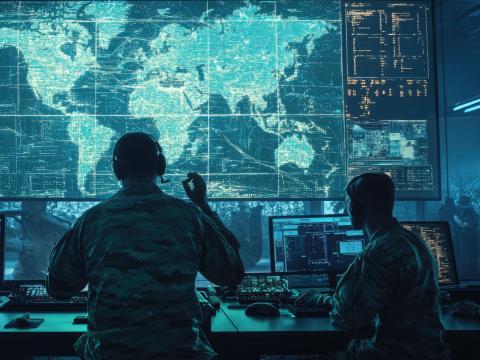Navy's Junior Officers Lead the Way to Innovation
The Navy has turned to reverse mentoring, following a global technology adoption trend.
After launching two junior officer-led innovation groups and a Special Capabilities Office, Chief of Naval Operations Adm. Lisa Franchetti sees autonomous platforms as the way ahead.
“It’s two junior officers, two lieutenants that are now commanding two groups: Task Group 59.1 and Task Force Hopper,” said Adm. Franchetti during a keynote address at WEST 2024 in San Diego.
Task Group 59.1 develops unmanned capabilities and Task Force Hopper concentrates on artificial intelligence and machine learning.
These groups join the new Disruptive Capabilities Office, reporting directly to Adm. Franchetti and Carlos del Toro, secretary of the Navy.
The chief of Naval Operations drew historic parallels with challenges faced by commanders in the 1930s and 1970s. In those periods the Navy had to innovate to face looming challenges and had to adopt new doctrines and technologies.
On this, she spoke about the sailors the service needs.
We need “leaders who are ready to take the initiative and to be bold; we’re experimenting with new concepts and tactics,” Adm. Franchetti told the audience.
Therefore, the new ideas arriving at the force are many.
“I think unmanned systems have an enormous potential to multiply our combat power by complementing our existing fleet of ships, submarines and aircraft through manned-unmanned teaming, especially in areas like maritime surveillance and reconnaissance, mine countermeasures, operations, seabed exploration and carrier airwing support,” Adm. Franchetti explained.
Newer and AI-powered systems go hand in hand with improved connectivity to acquire and use the data at appropriate speeds.
“We're pursuing fleet-wide connectivity through Project Overmatch and a scalable, netted, combat system through the Integrated Combat System, to effectively support distributed maritime operations and to achieve decision superiority and lethality at machine speed,” she said.
New technology adoption goes beyond warfare to keep vessels in the water.
“We’re using artificial intelligence, machine learning and new technologies to maintain, repair and deliver our platforms on contract and in the shipyards more quickly, cheaply and effectively,” Adm. Franchetti said, explaining how additive manufacturing and 3D printing is employed on land and aboard carriers and amphibious assault vessels.
We must accelerate change now, to rise to the challenge of this increasingly competitive environment.
Among the positive consequences of allowing sailors to perform advanced function is job satisfaction and retention.
“Retention is actually very high right now; we recognize we need to retain one sailor at a time,” Adm. Franchetti explained.
And as weapons become more sophisticated, so do the people who operate those systems.
“We need warfighters who ruthlessly pursue warfighting excellence, who can deliver the advantage of autonomous and unmanned systems, who can operate and innovate alongside their systems and who have the knowledge to deal with mission and navigation autonomy, and can work across many domains in lockstep with the experimentation and scaling of emerging and disruptive technologies,” the admiral told the audience.
Her address ended with a call to industry, academia and sailors to continue efforts toward keeping the U.S. Navy an effective fighting force.
“We must accelerate change now, to rise to the challenge of this increasingly competitive environment,” Adm. Franchetti said before closing the first keynote of the event.
AFCEA co-hosts WEST 2024 with the U.S. Naval Institute. The yearly event will continue until February 15. You can join the conversation on this event on X, formerly Twitter, using the hashtag #WEST2024.




Comments